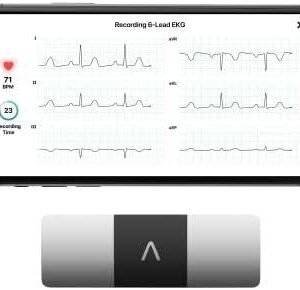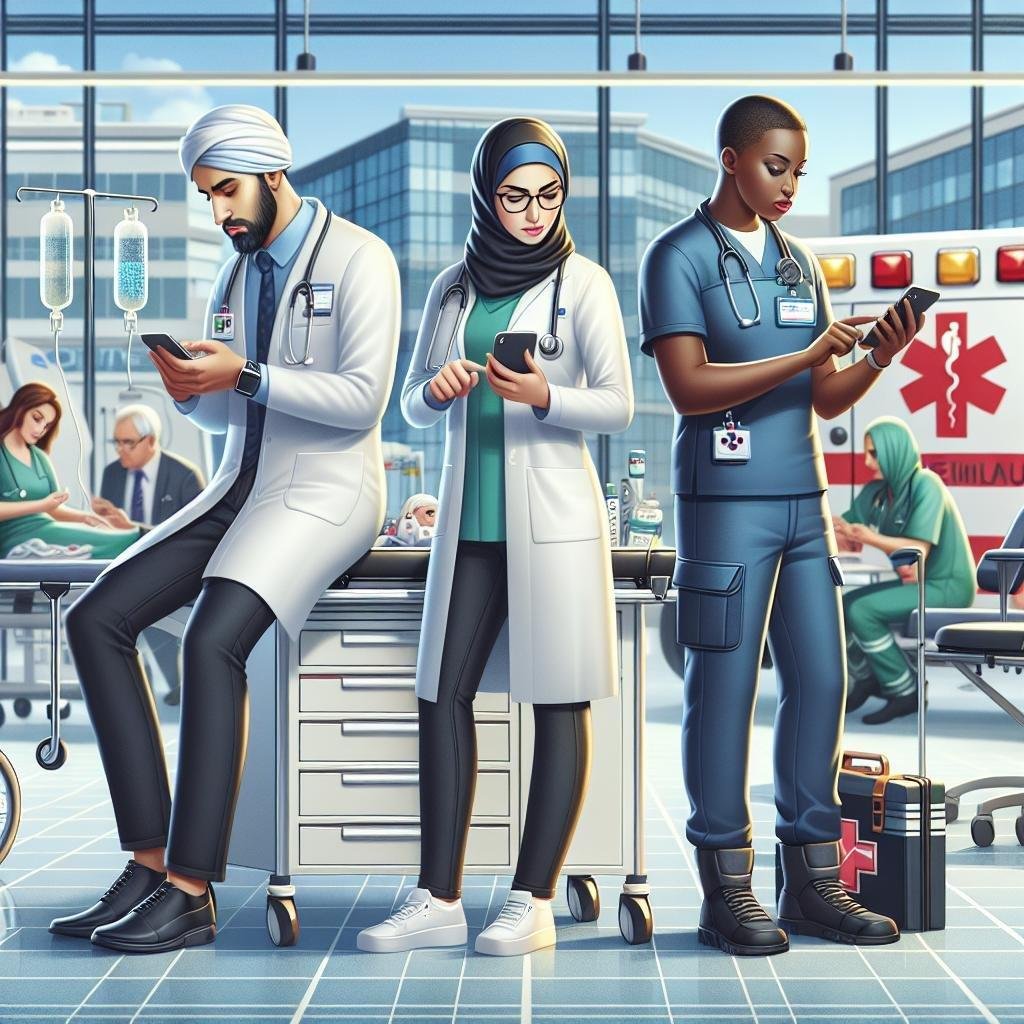In the rapidly evolving landscape of healthcare, the advent of mobile applications has emerged as a transformative force, redefining the paradigms of patient care and engagement. As healthcare systems across the globe strive to enhance service delivery, mobile apps have become integral tools that not only streamline processes but also empower patients to take an active role in managing their health. This article explores the multifaceted role of mobile applications in healthcare, examining their impact on communication between patients and providers, the facilitation of chronic disease management, and the enhancement of treatment adherence. Through a detailed analysis of current technologies and their implementation in clinical settings, we aim to uncover the potential of mobile health (mHealth) solutions in fostering improved patient outcomes, optimizing workflow efficiencies, and ultimately reshaping the future of healthcare delivery.
Table of Contents
- Emerging Trends in Mobile Health Applications and Their Impact on Patient Engagement
- Integrating Mobile Apps into Clinical Workflow for Enhanced Communication and Monitoring
- Data Security and Privacy Considerations in Healthcare Mobile Applications
- Future Directions: Innovations and Recommendations for Optimizing Patient Care through Technology
- In Summary
Emerging Trends in Mobile Health Applications and Their Impact on Patient Engagement
As mobile health applications continue to evolve, they are reshaping the landscape of patient engagement through innovative functionalities and user-centric designs. Wearable technology integrated with mobile apps provides real-time health monitoring, enabling patients to track vital statistics such as heart rate, blood pressure, and glucose levels. This data not only empowers patients to take an active role in their healthcare management but also enhances communication with providers through seamless information sharing. Additionally, the rise of artificial intelligence (AI) within mobile health apps presents personalized health recommendations, further tailoring the patient experience to individual needs and preferences. Such advancements foster a deeper emotional connection to health management, increasing the likelihood of adherence to treatment plans and improving health outcomes.
Moreover, social connectivity features embedded within these applications are playing a crucial role in promoting community support and collaboration among patients. Through forums and chat functionalities, users can share experiences, discuss challenges, and celebrate successes, creating an environment of encouragement and accountability. This communal aspect not only combats feelings of isolation but also stimulates greater participation in health-related activities. The following table highlights some key features and their impact on patient engagement:
| Feature | Impact on Patient Engagement |
|---|---|
| Real-time Monitoring | Enhances self-management and daily engagement |
| AI-Driven Recommendations | Increases personalized care and motivation |
| Social Connectivity | Fosters support network and accountability |
| Gamification Elements | Improves user engagement through rewards and challenges |
Integrating Mobile Apps into Clinical Workflow for Enhanced Communication and Monitoring
Incorporating mobile applications into clinical workflows can significantly streamline communication between healthcare providers and patients. Real-time messaging features enable instant sharing of vital health information, while push notifications keep patients informed about appointments, medication schedules, and lifestyle modifications. By facilitating secure communication channels, mobile apps reduce the time spent on administrative tasks, allowing practitioners to focus more on patient care. This seamless integration fosters a collaborative environment where patients feel empowered to participate actively in their health journeys.
Monitoring patient progress becomes more efficient through the use of mobile apps that collect and analyze health data. These applications can track various metrics, such as vital signs, symptoms, and adherence to treatment protocols. The integration of wearable technology and mobile apps can provide healthcare professionals with a comprehensive view of a patient’s health, enabling them to make informed decisions. Below is an example of the types of data that can be tracked:
| Data Type | Description |
|---|---|
| Heart Rate | Real-time tracking of heartbeats |
| Medication Adherence | Tracking whether patients take medications as prescribed |
| Disease Symptoms | Logging daily symptoms experienced by patients |
| Physical Activity | Monitoring activity levels and exercise routines |
Data Security and Privacy Considerations in Healthcare Mobile Applications
As mobile applications become integral to healthcare delivery, ensuring the security and privacy of patient data is paramount. Compliance with regulations such as HIPAA (Health Insurance Portability and Accountability Act) in the U.S. is essential for any application that handles personal health information (PHI). Healthcare mobile apps must employ robust encryption protocols to safeguard data both at rest and in transit. Additionally, user authentication measures, such as multi-factor authentication (MFA), enhance the security landscape, protecting sensitive information from unauthorized access. Other critical considerations include:
- Regular security assessments to identify vulnerabilities.
- Secure coding practices during app development to avoid loopholes.
- Data minimization principles to limit the collection of personal information to what is necessary.
- User education about best practices for maintaining data privacy.
Furthermore, organizations developing mobile healthcare applications must establish transparent privacy policies that clearly outline data handling practices. This transparency fosters trust and enables patients to make informed decisions regarding their personal health data. Implementing a comprehensive incident response plan ensures that any data breaches are managed effectively, minimizing potential harm to patients. The following table summarizes key privacy features to consider when developing healthcare apps:
| Privacy Feature | Importance |
|---|---|
| Data Encryption | Protects sensitive information from unauthorized access |
| User Consent Management | Ensures patients have control over their data sharing preferences |
| Audit Trails | Tracks access and changes to patient data for accountability |
| Regular Updates | Patches vulnerabilities to keep the app secure over time |
Future Directions: Innovations and Recommendations for Optimizing Patient Care through Technology
The integration of mobile applications in healthcare is rapidly evolving, paving the way for innovative approaches to enhance patient care. To fully leverage these technologies, healthcare providers must focus on user-friendly designs, data security, and interoperability. Recommended innovations include:
- Telehealth Solutions: Expanding virtual consultations to increase accessibility and reduce patient wait times.
- Personalized Health Monitoring: Utilizing wearables that sync with mobile apps to provide real-time health updates and alerts.
- AI-driven Chatbots: Implementing intelligent systems for 24/7 patient support, appointment reminders, and symptom checking.
Furthermore, it’s essential to establish strong partnerships between technology developers and healthcare professionals to ensure that patient needs are at the forefront. A focus on training healthcare workers to utilize mobile technology effectively will also foster better patient engagement. A summary of critical recommendations is presented in the table below:
| Recommendation | Description |
|---|---|
| Enhance Data Privacy | Implement robust encryption and security protocols to protect patient data. |
| Cross-Platform Integration | Develop apps that seamlessly integrate with existing healthcare systems and devices. |
| Patient Education Resources | Incorporate tutorials and informational materials into apps to promote informed health decisions. |
In Summary
the integration of mobile applications into healthcare has proven to be a transformative influence on patient care. By facilitating real-time communication, enhancing accessibility to medical resources, and promoting active patient engagement, these technologies are shaping a more efficient and patient-centered healthcare landscape. As mobile health applications continue to evolve, it is imperative for healthcare professionals and institutions to remain abreast of the latest developments in this field to fully leverage the benefits they offer. The ongoing collaboration between technologists, healthcare providers, and policymakers will be crucial in addressing the challenges that accompany this digital shift, ensuring that mobile applications are implemented effectively and ethically. Ultimately, by harnessing the capabilities of mobile technology, we can advance the quality of care, improve health outcomes, and foster a more informed and proactive patient population. The future of patient care is undeniably mobile, and its potential is vast.





